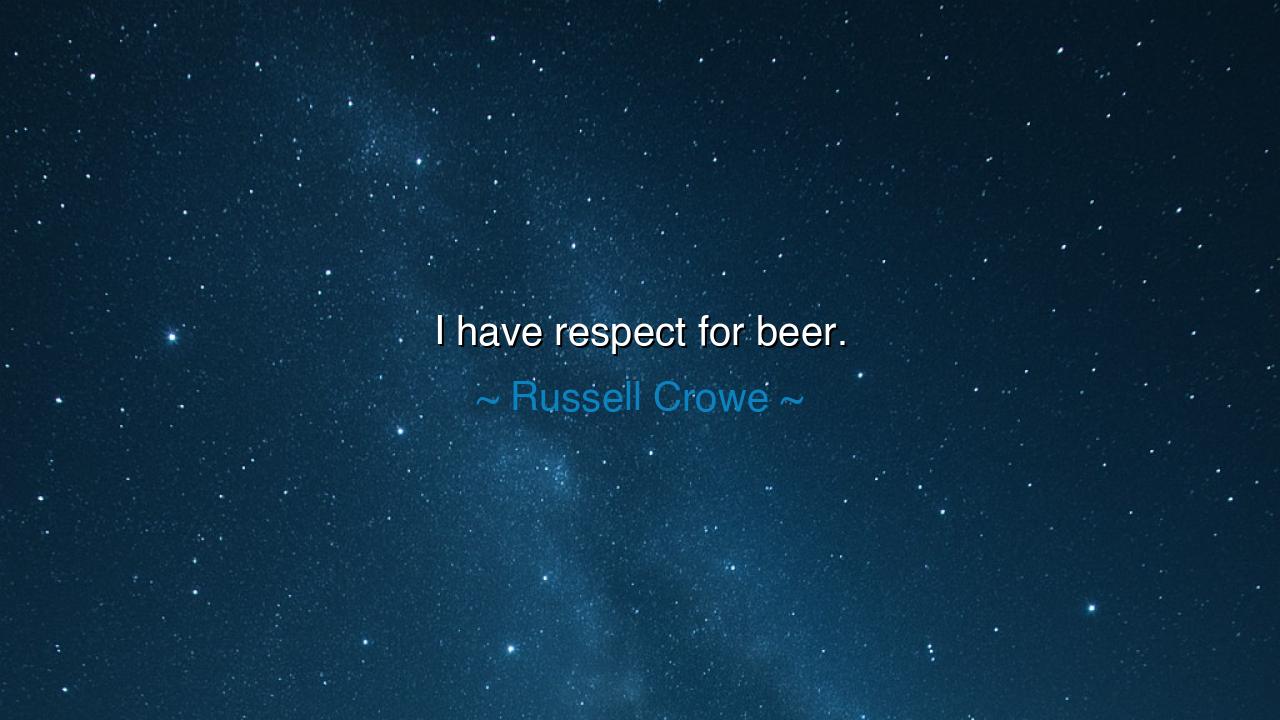
I have respect for beer.






When Russell Crowe said, “I have respect for beer,” he spoke not as a mere lover of drink, but as a man who understands the sacred measure of respect — even for life’s simplest pleasures. In this humble statement lies a truth older than kings and conquerors: that the things which bring joy and fellowship must never be abused, but honored. For beer, in its ancient and golden simplicity, has long been a symbol of communion, gratitude, and moderation. To respect beer is not to worship indulgence, but to revere balance — the ancient art of knowing when enough is enough, and when pleasure becomes wisdom rather than folly.
The origin of beer itself reaches back into the dawn of civilization. Long before ink touched papyrus or iron met flame, the Sumerians brewed it from the bounty of the earth, offering it to the goddess Ninkasi, who was praised as the “giver of joy and sustenance.” In the clay tablets of that age, one finds hymns not only of devotion to the gods, but of gratitude for beer, for it nourished both body and spirit. To the ancients, this drink was not mere indulgence — it was a gift of the divine, a symbol of life’s shared sweetness amid the bitterness of toil. Thus, to “respect beer,” as Crowe declares, is to remember the sacred balance between work and rest, between labor and laughter.
Crowe’s words carry the wisdom of one who has walked the line between discipline and delight. A warrior in spirit, both on screen and in life, he recognizes that strength is not found in denial of joy, but in mastery over it. The ancients taught this too: the philosopher Epicurus said that pleasure is not evil, but that unrestrained pleasure is the root of suffering. The wise man, he wrote, drinks when he chooses, not when he must. So, when Crowe says he has respect for beer, he reminds us that reverence is the soul of enjoyment — that one may lift a cup with honor, but never be enslaved by it.
Consider, too, the story of the monks of medieval Europe, who brewed beer not for profit or excess, but as an act of craft and devotion. In the silence of their abbeys, they fermented both barley and contemplation, perfecting recipes that would nourish travelers and sustain the poor. Their beer was not a vice, but a virtue — the result of patience, humility, and a love for creation’s bounty. To them, to respect beer was to respect the earth, the labor of hands, and the fellowship of humankind. Their craft endures even now, echoing through the centuries in every honest pour and heartfelt toast.
But there is a shadow to every light. For where there is pleasure, there is always the temptation to excess. Many through the ages have drowned not in the sea, but in the cup. The ancients warned of this, too: “All things in moderation,” said Solon of Athens, “for even honey can cloy.” Crowe’s respect, then, is not the admiration of a reveler, but the discipline of a mindful man. To respect beer is to enjoy it as a companion, not a conqueror; to share it in friendship, not in oblivion. It is to see in it a mirror of life itself — golden, fleeting, and best savored in good company.
The deeper meaning of this simple quote lies in its humility. To respect beer is to honor the small things that make existence rich — the warmth of conversation, the laughter of friends, the peace of an evening well earned. The ancients would have called this eudaimonia — the happiness born from harmony between body, soul, and the world. Such respect teaches gratitude, patience, and presence — the awareness that every good thing is a gift, and that gratitude, not greed, is the path to joy.
So, what then is the lesson? It is this: Respect everything that gives you joy. Whether it is beer, bread, art, or love — approach it with reverence. Do not rush it, do not misuse it, and do not forget its origin in the labor and kindness of others. When you drink, drink with heart. When you celebrate, celebrate with care. When you rest, rest with gratitude. For in every small act of respect, you preserve the dignity of life itself. And so, as Russell Crowe reminds us — to say “I have respect for beer” is, in truth, to say: I have respect for life.






AAdministratorAdministrator
Welcome, honored guests. Please leave a comment, we will respond soon